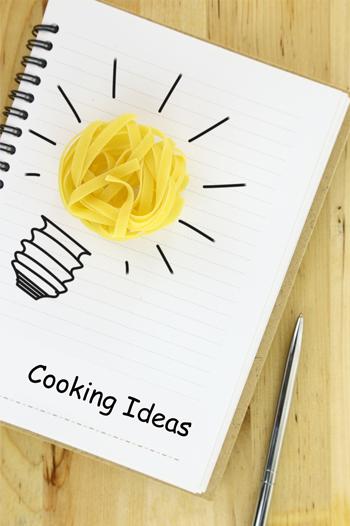Making a family cookbook
Duration/age

Getting the family to agree on what to eat can be tricky sometimes. Why not create a family cookbook to help everyone decide.
Gather the family together and talk about how you will organise the book and what you will put in it.
There are many different ways you could set up the cookbook. You could organise it by:
- family member - listing all the things each person likes
- food types - pasta, fruit, meat
- events and celebrations - birthdays, cultural festivals, naming days
- meal types - breakfast, lunch, dinner, afternoon tea
- snacks and lunches for kindy or school
Next talk about how you will display the recipes. Will you include a photo of the meal, have the recipe written out or add pictures of the utensils and ingredients?
We are going to use a scrapbook to make the cookbook. We can each have our own page to put in photos and ideas.
If we use a folder then we can add and move pages as we get more recipes.
Materials you will need
- Glue
- Pencils
- A book
- Recipes
- Ideas
Alternative tools
- Paper
- Computer
- Photos
- Folder
Skills this activity improves
Why does this matter?
Planning a family cookbook helps your child to learn about concepts of print and how a book is organised. As you plan the book together your child will be learning about the world and hearing new language.
By creating books with an adult, children develop an understanding of the different types of text or writing around them and how it is organised. They will hear the language of books like cover, front, chapter, illustration or ending. Understanding the language of books will help them to navigate a wide range of books, including fiction and non-fiction.
Children begin to see that books can have words and pictures just like a poster or the breakfast cereal box.
As children interact and plan the cookbook they are developing an understanding of how a story and information is organised.
What does this lead to?
As your child grows older understanding the different ways language can be presented will help them to make decisions on how to organise or record their thinking.
By helping to plan and design the cookbook, your child will discover that the picture, image or design gives greater meaning to the words on the page. Usually the image will connect to those words and lead the reader to the next part of the story or text. The image helps the reader to understand what they need to do and helps them to identify which piece of information is very important.
Language to use
- Front cover, back cover, title, illustration, author, chapter, section
- Words, pictures, recipe
- Punctuation, capital letter, full stop, question mark
- Question, sentence
- Ingredients, quantity
- Breakfast, lunch, dinner, snack
- Food category, type of food
- Utensils
- Sweet, savoury, desert, treat, fruit, dairy, meat, vegetable
Questions to use
- What recipe will you pick for your birthday?
- Do we all like the same food?
- Can you eat the same food for breakfast and dinner?
- Who likes sweet food?
Useful tips
- Sometimes a favourite recipe doesn't have to be an item you cook from scratch. It could be baked beans on toast.
- A favourite food or recipe might be more about the event or where you eat it rather than the food. If it is about where you eat include a photo of the place or event.
- By adding family photos and pictures all the members of the family can use the cookbook to pick a meal.
- Take a look at Food and Celebrations for ideas for your family cookbook.
- Remember to talk to your child in your home language.
More ideas
- Go to the library and look at children’s recipe books.
- Take photos of your family enjoying food and meals in different places and locations.
- Take photos of ingredients, utensils and cooking tools to use in the cookbook.
- Create a shopping list bingo card for favourite recipes.
Variation by age
Birth to two year olds
- Take photos of your child eating their favourite food.
- Borrow books about food from the library.
- Your child could use the junk mail catalogues to show you what they like to eat.
Questions to ask
- What do you like to eat?
- What is that?
- Who likes that?
Questions to ask
- What do you like to eat?
- What is that?
- Who likes that?
- When do you eat that?
Language to use
- Like, favourite, dislike, hate
- Fruit, vegetable, dairy, meat
- Breakfast, lunch, dinner, snack
Language to use
- Like, favourite, dislike, hate
- Fruit, vegetable, dairy, meat
- Breakfast, lunch, dinner, snack


